James Burke - Cadillac Jukebox
Здесь есть возможность читать онлайн «James Burke - Cadillac Jukebox» весь текст электронной книги совершенно бесплатно (целиком полную версию без сокращений). В некоторых случаях можно слушать аудио, скачать через торрент в формате fb2 и присутствует краткое содержание. Жанр: Триллер, на английском языке. Описание произведения, (предисловие) а так же отзывы посетителей доступны на портале библиотеки ЛибКат.
- Название:Cadillac Jukebox
- Автор:
- Жанр:
- Год:неизвестен
- ISBN:нет данных
- Рейтинг книги:5 / 5. Голосов: 1
-
Избранное:Добавить в избранное
- Отзывы:
-
Ваша оценка:
- 100
- 1
- 2
- 3
- 4
- 5
Cadillac Jukebox: краткое содержание, описание и аннотация
Предлагаем к чтению аннотацию, описание, краткое содержание или предисловие (зависит от того, что написал сам автор книги «Cadillac Jukebox»). Если вы не нашли необходимую информацию о книге — напишите в комментариях, мы постараемся отыскать её.
Cadillac Jukebox — читать онлайн бесплатно полную книгу (весь текст) целиком
Ниже представлен текст книги, разбитый по страницам. Система сохранения места последней прочитанной страницы, позволяет с удобством читать онлайн бесплатно книгу «Cadillac Jukebox», без необходимости каждый раз заново искать на чём Вы остановились. Поставьте закладку, и сможете в любой момент перейти на страницу, на которой закончили чтение.
Интервал:
Закладка:

James Lee Burke
Cadillac Jukebox
When Aaron Crown is finally imprisoned for the decades-old murder of Ely Dixon, it is to Dave Robicheaux that he proclaims his innocence loudest. Dave isn't keen to get involved, but then a filmmaker seeking to prove Crown's innocence is murdered and the mob accuse Dave of taking a pay-off.
The ninth book in the Dave Robicheaux series
for Russ and Jayne Piazza
CHAPTER 1
AARON CRown should not have come back into our lives. After all, he had never really been one of us, anyway, had he? His family, shiftless timber people, had come from north Louisiana, and when they arrived in Iberia Parish, they brought their ways with them, occasionally stealing livestock along river bottoms, poaching deer, perhaps, some said, practicing incest.
I first saw Aaron Crown thirty-five years ago when, for a brief time, he tried to sell strawberries and rattlesnake watermelons out on the highway, out of the same truck he hauled cow manure in.
He seemed to walk sideways, like a crab, and wore bib overalls even in summertime and paid a dollar to have his head lathered and shaved in the barber shop every Saturday morning. His thick, hair-covered body gave off an odor like sour milk, and the barber would open the front and back doors and turn on the fans when Aaron was in the chair.
If there was a violent portent in his behavior, no one ever saw it. The Negroes who worked for him looked upon him indifferently, as a white man who was neither good nor bad, whose moods and elliptical peckerwood speech and peculiar green eyes were governed by thoughts and explanations known only to himself. To entertain the Negroes who hung around the shoeshine stand in front of the old Frederick Hotel on Saturday mornings, he'd scratch matches alight on his clenched teeth, let a pool of paraffin burn to a waxy scorch in the center of his palm, flip a knife into the toe of his work boot.
But no one who looked into Aaron Crown's eyes ever quite forgot them. They flared with a wary light for no reason, looked back at you with a reptilian, lidless hunger that made you feel a sense of sexual ill ease, regardless of your gender.
Some said he'd once been a member of the Ku Klux Klan, expelled from it for fighting inside a Baptist church, swinging a wood bench into the faces of his adversaries.
But that was the stuff of poor-white piney woods folklore, as remote from our French-Catholic community as tales of lynchings and church bombings in Mississippi.
How could we know that underneath a live oak tree hung with moss and spiderwebs of blue moonlight, Aaron Crown would sight down the barrel of a sporterized Mauser rifle, his body splayed out comfortably like an infantry marksman's, the leather sling wrapped tightly around his left forearm, his loins tingling against the earth, and drill a solitary round through a plate glass window into the head of the most famous NAACP leader in Louisiana?
It took twenty-eight years to nail him, to assemble a jury that belonged sufficiently to a younger generation that had no need to defend men like Aaron Crown.
Everyone had always been sure of his guilt. He had never denied it, had he? Besides, he had never been one of us.
It was early fall, an election year, and each morning after the sun rose out of the swamp and burned the fog away from the flooded cypress trees across the bayou from my bait shop and boat-rental business, the sky would harden to such a deep, heart-drenching blue that you felt you could reach up and fill your hand with it like bolls of stained cotton. The air was dry and cool, too, and the dust along the dirt road by the bayou seemed to rise into gold columns of smoke and light through the canopy of oaks overhead. So when I glanced up from sanding the planks on my dock on a Saturday morning and saw Buford LaRose and his wife, Karyn, jogging through the long tunnel of trees toward me, they seemed like part of a photograph in a health magazine, part of an idealized moment caught by a creative photographer in a depiction of what is called the New South, rather than an oddity far removed from the refurbished plantation home in which they lived twenty-five miles away.
I convinced myself they had not come to see me, that forcing them to stop their run out of reasons of politeness would be ungenerous on my part, and I set down my sanding machine and walked toward the bait shop.
"Hello!" I heard Buford call.
Your past comes back in different ways. In this case, it was in the form of Karyn LaRose, her platinum hair sweat-soaked and piled on her head, her running shorts and purple-and-gold Mike the Tiger T-shirt glued to her body like wet Kleenex.
"How y'all doin'?" I replied, my smile as stiff as ceramic.
"Aaron Crown called you yet?" Buford asked, resting one hand on the dock railing, pulling one ankle up toward his muscular thigh with the other.
"How'd you know?" I said.
"He's looking for soft-hearted guys to listen to his story." Buford grinned, then winked with all the confidence of the eighty-yard passing quarterback he'd been at L.S.U. twenty years earlier. He was still lean-stomached and narrow-waisted, his chest flat like a prizefighter's, his smooth, wide shoulders olive with tan, his curly brown hair bleached on the tips by the sun. He pulled his other ankle up behind him, squinting at me through the sweat in his eyebrows.
"Aaron's decided he's an innocent man," he said. "He's got a movie company listening to him. Starting to see the big picture?"
"He gets a dumb cop to plead his cause?" I said.
"I said 'soft-hearted,'" he said, his face beaming now.
"Why don't you come see us more often, Dave?" Karyn asked.
"That sounds good," I said, nodding, my eyes wandering out over the water.
She raised her chin, wiped the sweat off the back of her neck, looked at the sun with her eyelids closed and pursed her lips and breathed through them as though the air were cold. Then she opened her eyes again and smiled good-naturedly, leaning with both arms on the rail and stretching her legs one at a time.
"Y'all want to come in for something to drink?" I asked.
"Don't let this guy jerk you around, Dave," Buford said.
"Why should I?"
"Why should he call you in the first place?"
"Who told you this?" I asked.
"His lawyer."
"Sounds like shaky legal ethics to me," I said.
"Give me a break, Dave," he replied. "If Aaron Crown ever gets out of Angola, the first person he's going to kill is his lawyer. That's after he shoots the judge. How do we know all this? Aaron called up the judge, collect, mind you, and told him so."
They said good-bye and resumed their jog, running side by side past the sprinklers spinning among the tree trunks in my front yard. I watched them grow smaller in the distance, all the while feeling that somehow something inappropriate, if not unseemly, had just occurred.
I got in my pickup truck and caught up with them a quarter mile down the road. They never broke stride.
"This bothers me, Buford," I said out the window. "You wrote a book about Aaron Crown. It might make you our next governor. Now you want to control access to the guy?"
"Bothers you, huh?" he said, his air-cushioned running shoes thudding rhythmically in the dirt.
"It's not an unreasonable attitude," I said.
Karyn leaned her face past him and grinned at me. Her mouth was bright red, her brown eyes happy and charged with energy from her run.
"You'll be bothered a lot worse if you help these right-wing cretins take over Louisiana in November. See you around, buddy," he said, then gave me the thumbs-up sign just before he and his wife poured it on and cut across a shady grove of pecan trees.
Читать дальшеИнтервал:
Закладка:
Похожие книги на «Cadillac Jukebox»
Представляем Вашему вниманию похожие книги на «Cadillac Jukebox» списком для выбора. Мы отобрали схожую по названию и смыслу литературу в надежде предоставить читателям больше вариантов отыскать новые, интересные, ещё непрочитанные произведения.
Обсуждение, отзывы о книге «Cadillac Jukebox» и просто собственные мнения читателей. Оставьте ваши комментарии, напишите, что Вы думаете о произведении, его смысле или главных героях. Укажите что конкретно понравилось, а что нет, и почему Вы так считаете.












